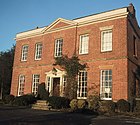Portal:Lancashire/Selected town
| This Wikipedia page has been superseded by Portal:Lancashire and is retained primarily for historical reference. |
| Note: Article entries are now being transcluded directly on the main portal page. However, this page should be retained for historical reference. |
Archive
[edit]Selected town/1
[edit]Burnley is a large post-industrial market town in Lancashire, with a population of around 73,500. It also gives its name to the Borough and UK Parliament constituency in which it is situated. It lies 21 miles (34 km) north of Manchester and 25 miles (40 km) east of Preston, at the confluence of the River Calder and River Brun.
It began life in the early medieval period as a number of farming hamlets surrounded by manor houses and royal forests. Its main period of expansion came during the Industrial Revolution, when it grew into one of Lancashire's most prominent Mill towns. At its peak, it became one of the world's largest producers of cotton cloth and a major centre of engineering.
Selected town/2
[edit]Rivington is a small village and civil parish of the Borough of Chorley, Lancashire, England, occupying 2,538 acres (10.27 km2). It is about 6 miles (9.7 km) southeast of Chorley and about 8.5 miles (13.7 km) northwest of Bolton. Rivington is situated on the fringe of the West Pennine Moors, at the foot of Rivington Pike. According to the United Kingdom Census 2001 it had a population of 144.
Life in the Middle Ages centred on the families who owned the manor in what was then an isolated rural community. Agriculture, hand loom weaving, quarrying and mining occupied the few inhabitants until the middle of the 19th century. A grammar school was founded by charter of Queen Elizabeth I in 1556.
Selected town/3
[edit]Lancaster is the county town of Lancashire, England. It is situated on the River Lune and has a population of 45,952. Lancaster is a constituent settlement of the wider City of Lancaster, local government district which has a population of 133,914 and encompasses several outlying towns, including neighbouring Morecambe.
Long existing as a commercial, cultural and educational centre, Lancaster is the settlement that gives Lancashire its name. Lancaster has several unique ties to the British monarchy; the House of Lancaster was a branch of the English royal family, whilst the Duchy of Lancaster holds large estates on behalf of Queen Elizabeth II, who herself is also the Duke of Lancaster. Lancaster was granted city status in 1937.
Nominations
[edit]Town articles selected here should be assessed at class B or above on the article talkpage. Please place candidates in the section below ("New nominations") for future selected towns, using the following template:
=== [[Your town here]] ===
Include a summary or the first paragraph of the article here.
----
Include your reasons for nominating the article here. ~~~~
{{clear}}



